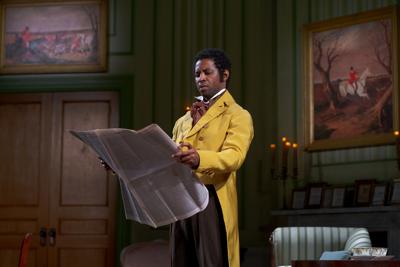In 1833 London, in the kind of show-must-go-on substitution that is the stuff of theater legend, actor Ira Aldridge stepped into the role of Othello, replacing Edmund Kean, the ailing English celebrity who had previously played the role in blackface. Aldridge was a Black American and accomplished Shakespeare interpreter, who had sought opportunity abroad after racism at minimum hindered his career in the U.S.
The New York-born thespian had found some success in Britain, where his previous roles had included Othello - a part it was almost unheard of for a Black actor to fill in his day - and he would go on to perform for rapturous audiences in continental Europe. But his high-profile save-the-day turn as Othello at London's Covent Garden encountered bald prejudice, as British playwright Lolita Chakrabarti recounts in her play "Red Velvet," at Shakespeare Theatre Company through July 17.
According to Amari Cheatom, who embodies the character in the STC production, directed by Jade King Carroll, Aldridge was a "pioneer" for Black actors. "It's kind of crazy that he isn't a more major figure in Western theater history," says Cheatom. Aldridge, he notes, "loosened the grip of the White gaze in Western theater."
A 36-year-old Juilliard-trained performer whose stage and screen credits include the movie "Judas and the Black Messiah," Cheatom brings a keen awareness of historical context to "Red Velvet," as well as a sense of its current resonance. He weighed in on both topics in a recent interview, conducted by email while he recuperated from covid-19.
Among the aspects of Aldridge's achievements that impressed Cheatom is the acting style that made the 19th-century actor arguably ahead of his time. Aldridge favored a relatively realistic approach - a striking contrast to the more declamatory, posturing star turns then in vogue. "He does not bother about the majestic stride, but moves about completely naturally, not like a tragedian, but like a human being," a 19th-century critic marveled.
This kind of natural portrayal was "revolutionary" for the time, says Cheatom, who compares the shock value to staging "Othello" on Mars today, with the title character "warring over plots on the Red Planet, with [the play's villain] Iago wiping the blood-red dust from his deeds on the front of a white spacesuit."
He adds that the naturalness of Aldridge's 1833 Othello was probably all the more disquieting to audiences because of the way the character - described by Shakespeare as a Moor - murders his Venetian wife, Desdemona.
"To see a Black body in power, expressing strength over a White body, was too much for the public of his time to digest," Cheatom says. "Ira's portrayal forced his audiences to witness what colonial powers of the time were trying their best to repress: Black power, strength, love, sexuality and emotion."
Perhaps testifying to that would-be repression, Aldridge's run in "Othello" at Covent Garden was cut short after some negative and racist reviews and, reportedly, disgruntled reactions by friends of actress Ellen Tree, who played Desdemona (and who is played in the STC production by Emily DeForest). While chronicling these events in "Red Velvet," which premiered in London in 2012, Chakrabarti weaves in a seismic historical development of 1833: the lead-up to the passage of Britain's Slavery Abolition Act.
Her play arrives in Washington at a time of widespread soul-searching over race and representation, potentially giving the script added currency.
"This play is really about identity," Cheatom says. "How does the gaze of a political or social majority determine how an individual identifies themselves? Is there value in the discord the majority experiences from loss of control over identity? What is the cost to reclaim control of your own identity?"
With plot twists that touch on fight direction, backstage tensions and reviews, "Red Velvet" is also a play about the acting life. Cheatom appreciates that aspect as well.
"This business is fickle," he says. "So much of your success as an actor is built on people 'liking' you. Being blacklisted or 'canceled' is as easy as the right person (or people) in power deciding they don't like you. And their reasons can be as ridiculous now as they were in Ira's time: playing a role as you artistically see fit, challenging the status quo, being a certain color or having a certain religious background. Talent is one thing, but if you're not liked by the people in power, there's not much you can do but keep on pushing."
No wonder he sees his character in "Red Velvet" as "beyond layered." In addition to his film credits, Cheatom has appeared onstage in New York and at high-profile regional theaters around the country. But, he says, "every role I've ever played feels like it's been preparing me for this one."








(0) comments
Welcome to the discussion.
Log In
Keep it Clean. Please avoid obscene, vulgar, lewd, racist or sexually-oriented language.
PLEASE TURN OFF YOUR CAPS LOCK.
Don't Threaten. Threats of harming another person will not be tolerated.
Be Truthful. Don't knowingly lie about anyone or anything.
Be Nice. No racism, sexism or any sort of -ism that is degrading to another person.
Be Proactive. Use the 'Report' link on each comment to let us know of abusive posts.
Share with Us. We'd love to hear eyewitness accounts, the history behind an article.